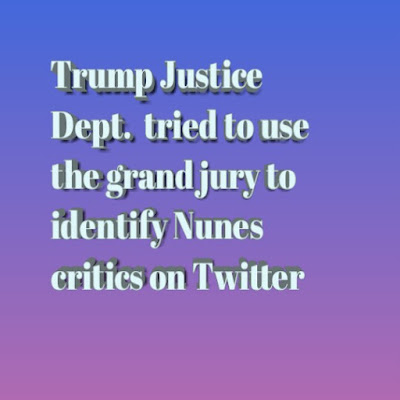Trump Justice Dept. tried to use the grand jury to identify Nunes critics on Twitter.
WASHINGTON - President Donald Trump's Justice Department secretly obtained a summons in a high court last year to identify a Twitter account holder who allegedly made fun of California's lawyer David Nunes, according to a recent court document.
But Twitter has struggled with court summonses and related orders that have barred the company from speaking publicly about it. Twitter officials questioned whether the Justice Department could abuse the power to enforce retaliation against Nunes, a Republican critic close to Trump, for violating the First Amendment.
According to a source familiar with the matter, the Department of Justice withdrew its summons this spring after President Joe Biden took office.
What happened after the summons is still unclear. The inclusion - a proposal to suppress the summons and the revocation of the gag order made by Twitter in March - indicates that the Department of Justice sent the company a request on November 24 to provide user ID details @NunesAlt.
Twitter immediately seems suspicious of the authenticity of the request. The user of this account, the file states, "appears to have been involved in a series of explicit first amendments to the views of current affairs, government policy, and in particular one elected official - Congressman Nunes."
The inclusion of these letters provided examples of other tweets of the account, such as a picture of Nunes with the caption on his face: “Believe in conspiracy theories. Although there is no evidence. "
As chairman of the House Intelligence Committee until Democrats took over the Chamber after the 2018 election, Nunes used his position to make claims in support of Trump's claim that Russia's investigation was a "deep controversy" against him.
The Twitter post also revealed that Nunes and his lawyer had filed various lawsuits by exposing unscrupulous social media users who criticized him, including the so-called Congressman's beef account and the @NunesAlt account.
While Twitter pressured the Department of Justice with a statement, the government said the summons was part of a criminal investigation into violations of provincial law that made it a crime to use social media to threaten to harm anyone. However, the government declined to identify a specific tweet that became harmful.
In the company's file, the judge in charge of the case was asked to obtain a basis for urging the Department of Justice to prosecute the user.
"With the administrator holding confidential ID details requested by the government, Twitter is concerned that the letter summoned to court may be legally supported and therefore it is not necessary - let alone - for the government to disclose the user."
It further stated, "As such, Twitter is asking the court to scrutinize the government's reason for issuing the summons to determine whether the alleged breach of the First Amendment violates and should be repealed."
The grand jury subpoena was adopted by the United States Attorney General of the Columbia Region. At the time, the office was headed by Michael Sherwin, who was appointed by Attorney General William Barr.
A spokesman for the office did not respond to a request for comment or comment, including whether the basic investigation remains open. A transcript of the statement, which was attached to the court record on Twitter, revealed that the investigation was being conducted by Capitol police, who were defending Congress members.
A spokesman for Nunes did not respond to a request for comment.
The person in charge of the @NunesAlt account seemed surprised by this file. He wrote in a post Monday afternoon that "there's nothing remarkable about me," adding, "Then why am I being sued by the US Congressman? Why would the DOJ point me out? Do tweets also mean bad memes?"
Twitter said in a statement that it has "a responsibility to protect the freedom of speech of those who use our service. We have a strong record and we take seriously the trust placed in us to protect people's personal information on Twitter."









0 Comments
Please do not enter any spam link in the comment box.